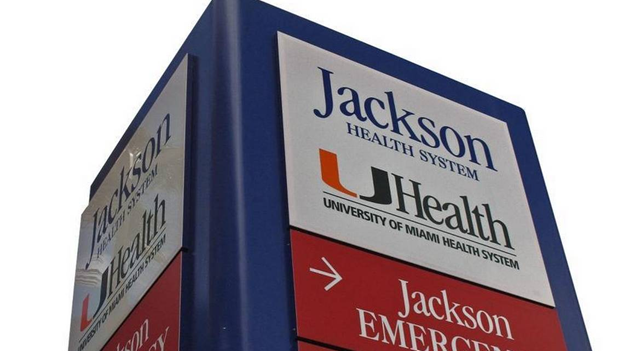Miami, FL | November 6, 2020 – Stumphauzer, Foslid, Sloman, Ross, and Kolaya’s Jeffrey Sloman was referenced in a Miami Herald article on a proposed $22 million settlement of a whistleblower lawsuit that Sloman filed on behalf of his client Jeffrey Lord against UM Health System.
UM agrees to pay millions to settle Medicare fraud allegations raised by whistle-blower
BY JAY WEAVER AND DANIEL CHANG
NOVEMBER 04, 2020 07:00 AM,
UPDATED NOVEMBER 05, 2020 06:08 PM

UHealth provides more than 90 percent of the physicians at Jackson, which is the training hospital for UM’s Miller School of Medicine. For a time, the relationship grew strained, partly because UM purchased the former Cedars Medical Center across the street. CARL JUSTE MIAMI HERALD STAFF
A federal lawsuit unsealed Monday after seven years of secrecy has revealed fraud allegations by a former University of Miami senior executive that the school’s healthcare system billed millions of dollars in unnecessary lab tests to Medicare and stuck patients with hidden charges for clinic visits.
The U.S. Justice Department began investigating the allegations after they were first raised by the former chief operating officer of the UM Miller School of Medicine, Jonathan “Jack” Lord, who filed a whistle-blower lawsuit in 2013.
Lord accused the university of filing false claims with Medicare for unnecessary organ transplant tests and overcharging patients for clinic visits during a period when UM was struggling with massive debt after undertaking an ambitious transformation of the medical school into a sprawling academic healthcare system under past president Donna Shalala. She is now a Miami congresswoman who suffered a surprising upset in her race for reelection late Tuesday.
Court records show UM and the Justice Department, which joined Lord’s lawsuit, have reached an “agreement in principle.” The proposed settlement is likely to cost the private university $22 million to resolve the so-called False Claims Act case.
UM said in a prepared statement, “We hope to finalize the settlement in the coming weeks,” and added that the university has not admitted any wrongdoing.
Lord, who was forced out by Shalala seven years ago, is expected to receive about $4 million as a reward for initiating the suit against his former employer.
Significantly, the imminent settlement means that the Justice Department has adopted a handful of key allegations in Lord’s complaint against Coral Gables-based UM, which operates a medical school out of the public Jackson Memorial Hospital in Miami and a sprawling UHealth network across four counties. The lawsuit was unsealed Monday by order of U.S. District Judge Cecilia Altonaga.
The U.S. Attorney’s Office in Miami and Justice Department, which prosecuted Lord’s whistle-blower case, declined to comment about the planned settlement.
Lord’s suit claims that illegal practices were “not only well known to UM at the highest corporate level, but were encouraged” — accusations that triggered “parallel criminal and civil investigations” into UM’s allegedly fraudulent billing of Medicare for organ transplant surgeries and other patient services.
However, the criminal probe led by the FBI and the Department of Health and Human Services concluded without any charges against the university or any employee, according to several sources familiar with the investigation.
Under the proposed settlement, UM has agreed to pay the federal government civil damages for overcharging the taxpayer-funded Medicare program for pathology lab services at Jackson Memorial. Lord’s whistle-blower suit claims that UM’s labs improperly billed the Medicare program for thousands of unnecessary pathology tests involving kidney and other organ transplant surgeries.
The university has also agreed to pay the Justice Department for imposing a surcharge on patients at UM-affiliated medical offices without notifying them of the actual cost for each visit. The patients were charged an extra hospital-based fee — sometimes in the hundreds of dollars — for visits to doctors’ offices that were not located at UM’s hospital campus in Miami. The surcharge was incurred by the Medicare program, which serves the elderly and indigent.
UM’s planned settlement with the federal government will resolve potentially hundreds of millions of dollars in disputed false claims over lab tests and patient surcharges spanning nearly a decade.
The agreement will allow the Medicare program to keep most of UM’s settlement payment. Lord will receive about 20% of the payment under a Justice Department formula for False Claims Act cases.
The big losers are UM Health System’s patients, especially those who paid out of pocket or through private insurers for the hidden hospital-based fees at doctors’ offices and clinics affiliated with the university. The patients won’t receive any compensation because a planned class-action case for the fee surcharges could not be filed within the statute of limitations while the whistle-blower suit was still under seal in Miami federal court.
UM’s lawyer downplayed the false billing allegations and stressed instead that patients received quality care from the UHealth System.
“These allegations have absolutely nothing to do with patient care but mostly derive from disagreements over regulatory interpretation,” UM’s attorney, Dan Gelber, told the Miami Herald. “The government has never claimed the University failed to provide excellent care to its patients or that it billed for services it did not provide. All other allegations have been outright abandoned by the government.”
Until now, neither the university nor UHealth had ever been the target of a Justice Department probe alleging fraudulent billing, which is the centerpiece of Lord’s whistle-blower case.
In 2013, the university was ordered to refund $3.7 million to Medicare after a federal audit of its billing practices found the hospital overcharged the program in 2009 and 2010, according to a report by the U.S. Department of Health and Human Services Office of Inspector General.
Lord’s whistle-blower suit, filed under seal in July 2013 by his attorney, Jeffrey Sloman, names only the university as a defendant. Lord’s attorney, with the Miami law firm Stumphauzer Foslid Sloman, said he could not comment on the case until there is a settlement.
Lord, now 66, was the No. 2 executive at UM’s Miller School of Medicine before being forced out in January 2013. But he wasn’t the only UM employee who alleged wrongdoing by the university.
Separately from Lord, two senior UM medical school physicians, Joshua Yelen and Philip Chen, in the pathology department, filed similar whistle-blower lawsuits — as did a former finance director for Jackson Memorial, Mitchell Wallace. Those suits, unlike Lord’s, name UM and Jackson Memorial as defendants.
But Lord’s suit was filed first, which means he will collect part of the settlement with the Justice Department. Both UM doctors, Yelen and Chen, will receive a portion of Jackson’s proposed settlement with the government. The amount of Jackson’s settlement in that case has not been disclosed.
SHALALA’S TENURE
In a recent court filing, Justice Department lawyers negotiating the settlement with UM brought up Shalala’s ongoing political campaign with Judge Altonaga as she considered unsealing the whistle-blower case.
“The government wishes to advise the [federal] court that the Lord and Chen/Yelen complaints contain allegations relating to former UM president and current Congresswoman Donna Shalala who is seeking reelection in the upcoming election on November 3, 2020,” Justice Department lawyers wrote in a status report filed with the judge last week. “Due to the proximity of the unsealing date to the election date, we wanted to bring this issue to the court’s attention.”
There was no explanation of the allegations but the Justice lawyers noted, “Congresswoman Shalala is not a party to this action or the proposed settlement with UM, and the Department of Justice takes no position as to the timing of the unsealing of the complaints in this matter.”
The judge unsealed the case one day before Election Day.
Shalala could not be reached for comment on Tuesday. Although she is not a named party in the whistle-blower dispute — the University of Miami is the only defendant — her legacy looms over it.
UHealth’s financial problems, Lord’s suit alleges, were the result of one of Shalala’s major decisions — an ambitious expansion into the healthcare business, starting with the purchase of the old Cedars of Lebanon Hospital. UM bought the hospital for $260 million in 2007, just as the real estate market and economy were about to crash. It added to a vast system that includes Sylvester Comprehensive Cancer Center, Bascom Palmer Eye Institute, a faculty practice of more than 1,200 physicians, and a network of more than 30 outpatient clinics across four counties. The system generates close to $2 billion a year in revenue for the university.
Shalala, who served as UM president from 2001 to 2015 after serving two full terms as Health and Human Services secretary in the Clinton administration, strived to put UM on the map as a nationally recognized institution.
An academic known for her formidable fund-raising skills and political influence, Shalala’s goal was to raise the profile of the university’s Miller School of Medicine, which tried to lure top talent with hefty salaries. Shalala not only recruited renowned cardiologist Pascal Goldschmidt from Duke University as the dean of UM’s medical school, but also landed Lord as chief operating officer. A Florida doctor, Lord had been the chief innovation officer and senior vice president at Humana, the health insurance giant.
But all three — Shalala, Goldschmidt and Lord — had to grapple with the financial fallout from UM’s purchase of the 560-bed Cedars hospital in 2007 just before the economy descended into a deep recession.
Shalala, backed by Goldschmidt, pushed for the purchase because she yearned to have a signature hospital that could transform UM into a world-class academic medical center. Her ambitions for UM’s medical school were impressive but some critics questioned the robust expansion, mainly because the school was already providing more than 90 percent of the staff of doctors at Jackson Memorial, the county’s taxpayer-owned facility located across the street from the old Cedars.
The Cedars purchase turned out to be a financial drain on UM, not to mention an albatross for Shalala and the university at large. The hospital lost $94.5 million in 2017 and $79 million in 2018, according to financial records. The acquisition and the subsequent strain of the university’s rapid expansion into healthcare led to the layoffs of about 900 full-time and part-time workers in May 2012. The layoffs so angered the UM medical school’s faculty that they called for the ouster of its dean, Goldschmidt, as well as Lord himself.
QUESTIONABLE BILLING
As this turmoil unfolded, UM’s healthcare system adopted new strategies to generate greater revenue, according to Lord’s suit.
His complaint alleges that one questionable billing practice began in 2007, when UM’s pathology services for organ transplants at the Miami Transplant Institute were placed under the control of the medical school’s surgery department, at the time headed by Alan Livingstone, a cancer surgeon. A turf battle erupted between the hospital’s surgery and pathology departments, who argued over the number of transplant lab tests for patients and who should oversee them, according to internal emails and documents reviewed by the Miami Herald.
Livingstone won out, the suit says, keeping the lucrative service under his oversight.
The suit claims the university’s pathology services at Jackson submitted bills to Medicare for thousands of “unsigned and unrequested” laboratory tests involving post-kidney and other transplant services. The practice, which ran from 2007 to 2015, generated millions of dollars in revenue for the surgery department as well as salary bonuses for Livingstone, the suit claims.
David O. Markus and Margot Moss, Livingstone’s attorneys, pushed back against Lord’s accusations of wrongdoing, and defended their client’s integrity.
“This was a shakedown, not a settlement,” the attorneys said in a prepared statement. “The doctors and administrators at the University of Miami — and specifically Dr. Alan Livingstone — are hard-working, amazing people who are saving lives.”
UM also defended the lab tests, calling them necessary to ensure that transplant organs were not rejected by the patients who received them.
Gelber, the university’s lawyer who is also mayor of Miami Beach, noted that the Miami Transplant Institute received high marks from federal regulators for patient care at the time and “best-in-class patient outcomes.”
The other central claim in Lord’s suit focuses on a “facility fee” that UHealth charged at outpatient clinics and doctors’ offices within its network in South Florida — billing for use of the facility in addition to the physician’s services without properly notifying patients and federal regulators of the surcharge.
Medicare rules require UHealth to notify patients and federal regulators in writing of any facility-fee surcharge added to a regular medical bill. UM claims it posted notices and informed patients of the additional charge. But Lord’s suit alleges that UHealth failed to disclose to patients the range of extra costs totaling hundreds of dollars for each clinic or office visit, as required by Medicare.
The facility fee rules allowing hospitals to charge patients extra for care at off-site clinics and doctor’s offices were written during the Clinton administration towards the end of Shalala’s term as HHS secretary. With proper licensing and notification, Medicare allows such extra fees at outpatient facilities located within 35 miles of a healthcare network’s main hospital. UHealth, for example, has a Sylvester Cancer Center in Deerfield Beach, where it charges the facility fee.
UHealth imposed the fee at its network of dozens of outpatient clinics across four counties, including Miami-Dade, Broward, Palm Beach and Collier counties.
After UHealth began imposing the fees, some patients protested that they were caught off guard by the additional out-of-pocket expense of $200 or more. The fees are supposed to cover the costs of hospital facilities and equipment.
The article is available on the following link: https://www.miamiherald.com/news/health-care/article246919602.html
About Stumphauzer Foslid Sloman Ross & Kolaya, PLLC
Stumphauzer Foslid Sloman Ross & Kolaya, PLLC (SFS) is a boutique full-service litigation firm based in Miami, Florida, that focuses on civil litigation, government regulatory enforcement matters, white collar criminal litigation, internal investigations, and whistleblower suits. The SFS lawyers litigate large, high-stakes or bet-the-company cases, but its attorneys take immense pride in their ability to efficiently handle disputes of all sizes. The firm is comprised of former BigLaw partners and high-ranking federal prosecutors, including the former chair of the Miami litigation practice of one of the largest law firms in the world and the United States Attorney for the Southern District of Florida. Colleagues, clients, and legal observers recognize the SFS lawyers as experts and leaders in their respective fields of practice. The firm and its lawyers have been recognized in Chambers & Partners, The Legal 500 United States, The Best Lawyers in America, Florida Super Lawyers, Florida’s Legal Elite, and U.S. News – Best Lawyers. For more information, visit http://www.sfslaw.com.


